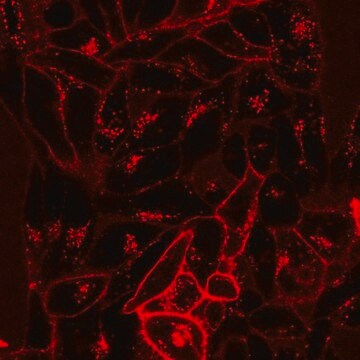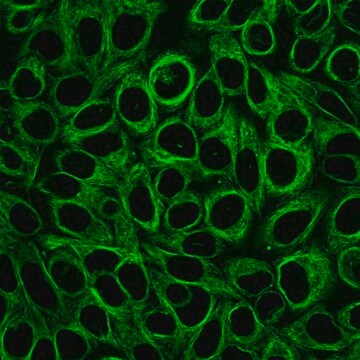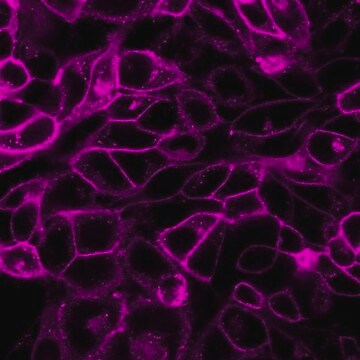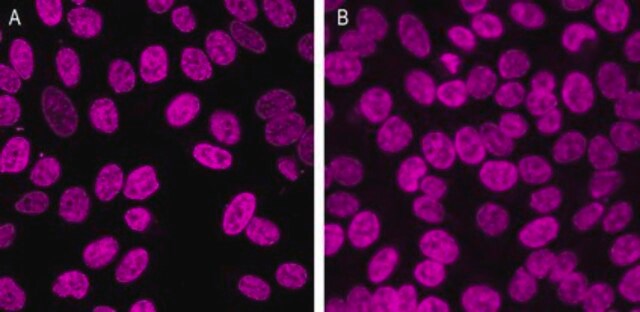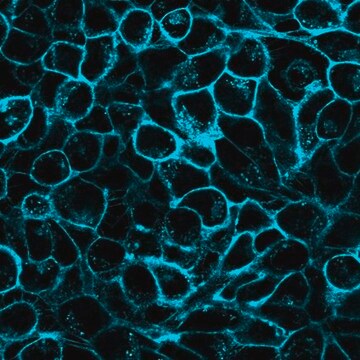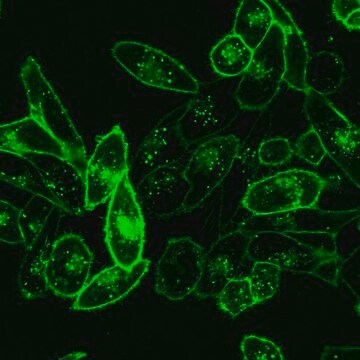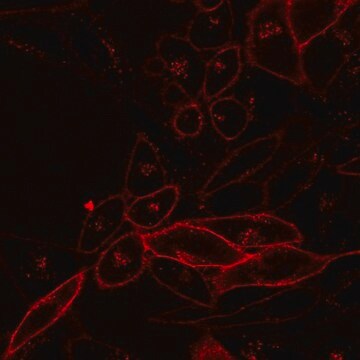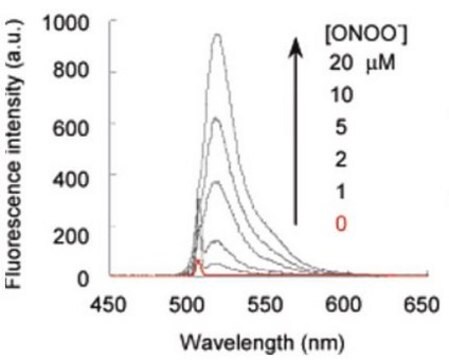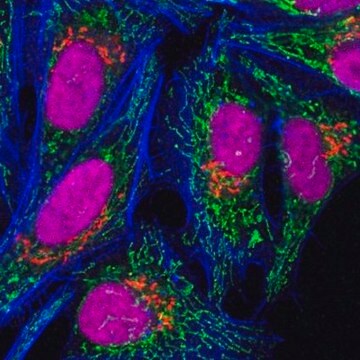SCT115
BioTracker NIR790 Cytoplasmic Membrane Dye
Live cell imaging lipophilic carbocyanine membrane dye suitable for long-term fluorescent cell labeling and cell tracking studies.
Synonim(y):
Live cell imaging probe
Zaloguj sięWyświetlanie cen organizacyjnych i kontraktowych
About This Item
Kod UNSPSC:
12352207
NACRES:
NA.47
Polecane produkty
metody
cell based assay: suitable
metoda wykrywania
fluorometric
Warunki transportu
ambient
Opis ogólny
Lipophilic carbocyanine dyes are widely used for labeling neurons in tissues by retrograde labeling, and to label membranes in a wide variety of cell types. The dyes are weakly fluorescent in aqueous phase, but become highly fluorescent in lipid bilayers. Staining is highly stable with low toxicity and very little dye transfer in between cells, making the dyes suitable for long-term cell labeling and tracking studies. When live cells are stained, the dyes label plasma membranes and also are taken up into endocytic compartments. Cells can be fixed either before or after staining, although permeabilization affects the staining pattern.
Unlike PKH dyes, BioTracker Cytoplasmic Membrane Dyes do not require a complicated hypoosmotic labeling protocol. They are ready-to-use dye delivery solutions that can be added directly to normal culture media to label suspended or adherent cells in culture.
NIR Cytoplasmic Membrane Dyes are novel near-infrared carbocyanine dyes for labeling the cytoplasmic membranes of living cells. Due to their long emission wavelengths, near-infrared cell membrane stains can be used to label cells for near-infrared small animal imaging studies for non-invasive imaging of cell migration and cell homing.
Spectral Properties
Absorbance: 786nm
Emission: 820nm
Unlike PKH dyes, BioTracker Cytoplasmic Membrane Dyes do not require a complicated hypoosmotic labeling protocol. They are ready-to-use dye delivery solutions that can be added directly to normal culture media to label suspended or adherent cells in culture.
NIR Cytoplasmic Membrane Dyes are novel near-infrared carbocyanine dyes for labeling the cytoplasmic membranes of living cells. Due to their long emission wavelengths, near-infrared cell membrane stains can be used to label cells for near-infrared small animal imaging studies for non-invasive imaging of cell migration and cell homing.
Spectral Properties
Absorbance: 786nm
Emission: 820nm
Zastosowanie
Live cell fluorescent imaging
Live cell imaging lipophilic carbocyanine membrane dye suitable for long-term fluorescent cell labeling and cell tracking studies.
Research Category
Cell Imaging
Cell Imaging
Research Sub Category
Live Cell Dye
Live Cell Dye
Jakość
Spectral Properties
Absorbance: 786nm
Emission: 820nm
Absorbance: 786nm
Emission: 820nm
Postać fizyczna
Liquid
Przechowywanie i stabilność
Store BioTracker NIR790 Cytoplasmic Membrane Dye at room temp. Protect From Light.
Note: Centrifuge vial briefly to collect contents at bottom of vial before opening.
Note: Centrifuge vial briefly to collect contents at bottom of vial before opening.
Oświadczenie o zrzeczeniu się odpowiedzialności
Unless otherwise stated in our catalog or other company documentation accompanying the product(s), our products are intended for research use only and are not to be used for any other purpose, which includes but is not limited to, unauthorized commercial uses, in vitro diagnostic uses, ex vivo or in vivo therapeutic uses or any type of consumption or application to humans or animals.
Ta strona może zawierać tekst przetłumaczony maszynowo.
Kod klasy składowania
10 - Combustible liquids
Klasa zagrożenia wodnego (WGK)
WGK 1
Temperatura zapłonu (°F)
188.6 °F - (refers to pure substance)
Temperatura zapłonu (°C)
87 °C - (refers to pure substance)
Certyfikaty analizy (CoA)
Poszukaj Certyfikaty analizy (CoA), wpisując numer partii/serii produktów. Numery serii i partii można znaleźć na etykiecie produktu po słowach „seria” lub „partia”.
Masz już ten produkt?
Dokumenty związane z niedawno zakupionymi produktami zostały zamieszczone w Bibliotece dokumentów.
Nasz zespół naukowców ma doświadczenie we wszystkich obszarach badań, w tym w naukach przyrodniczych, materiałoznawstwie, syntezie chemicznej, chromatografii, analityce i wielu innych dziedzinach.
Skontaktuj się z zespołem ds. pomocy technicznej